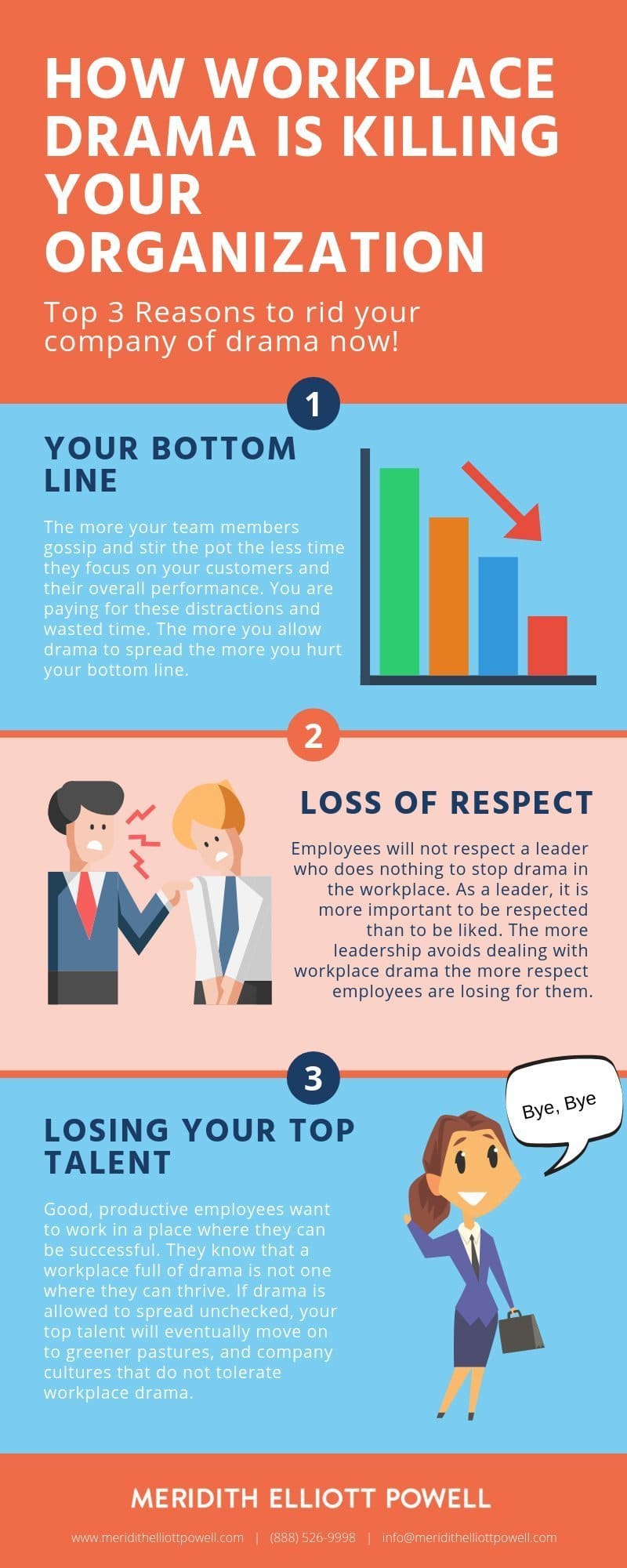Workplace Drama Can Kill Your Bottom Line
It never fails, no matter what industry I am working in, how strong the leadership is, or how much they focus on team building and support, every organization seems to suffer from workplace drama. Just last week I was working with a CEO who is brand new in her role. When I asked her what her biggest challenges were, despite being new in her role and being in a heavily competitive industry, she put office gossip and drama at the top of her list of challenges.
She shared that these are tough times and she needs every employee focused and engaged. Yet despite their best efforts both she and her leadership team are challenged with how to get workplace drama under control. So what is it with office drama, why do we have it, and how do we stop it?
We have workplace drama because we have people working for us.
Humans are emotional and whenever emotions are involved, you get gossip, hurt feelings, and some sort of adrenaline rush from stirring the pot! While I must admit it’s kind of fun to talk a little trash now and then, the office is not the place to do it.
As a leader, you need to understand that there are much bigger consequences to workplace drama than the fact that it gets on your nerves.
The level of drama you have in your workplace and the amount you tolerate directly impacts the overall success and performance of your organization.
If you want to increase your results in your company, then you need to understand office drama and how to stop it. As a leader you need to design a culture that does not tolerate the drama. Instead, your culture should promote effective communication and problem-solving strategies.
Why Stopping Drama Matters to You & Your Organization
3 ways that workplace drama impacts your organization
I am sure we would all agree that workplace drama can have a serious negative impact on your organization. However, we may not be aware of just how exactly drama will infect your company if allowed to continue. Uncontrolled workplace drama impacts your business in the following areas:
1. Your Bottom Line
The more your team members are gossiping or stirring the pot the less time they are focused on your customers and their overall performance. Drama takes time, time to start a conversation with another employee, time to be negative or angry, and time to spread it to other employees. That is time you are paying for, and time that is doing nothing to positively impact your bottom line.
2. Respect
Even employees who actively engage in workplace drama wonder why their leaders don’t do anything to stop it. As a leader, it is more important to be respected than to be liked, and the more you avoid dealing with workplace drama (no matter how small) the more respect your employees are losing for you.
3. Retain Top Talent
Good, productive employees want to work in a place where they can be successful. They are self-motivated and focused, and they know (even if you as the leader do not) that a workplace full of drama is not one where they can thrive. They will move on to greener pastures, and company cultures that do not tolerate workplace drama.
How To Stop Drama Cold
3 strategies to design a culture void of workplace drama
Now that we know the negative impacts, it is clear that investing time and energy to stop it will have a major impact on moving your company forward. The only question left is how do we stop it?
1. Don’t Engage
First and foremost, as a leader do not engage – no matter what. In any company, leaders set the tone and even if all you do is listen, the moment you allow employees to vent, you have just said that engaging in drama is accepted and encouraged in your company.
2. Face-To-Face
One of the biggest problems with workplace drama is that some of it is legitimate. To determine this, you will need to hear and flush out your employee’s issues. So if you, as the leader are not supposed to engage in drama, how are you going to flush out the problems that need to be heard?
You handle any issue an employee has face-to-face, meaning all parties involved. When someone comes to you and has an issue or problem (aka drama) you cut them off immediately. Let them know you want to hear the problem, but not without the other person present to ensure all parties tell their side of the story.
If you want to separate the real issues from the drama issues, nothing does it faster than not allowing employees to talk about departments, people or issues without those they are talking about present to hear and respond to the conversation.
3. Take Action
Most importantly, you as a leader need to take action. If workplace drama is going to stop, you need to stop it. That means that you need to follow steps one and two, and beyond that you need to enforce it.
Creating a culture that encourages teamwork, development of employees, and promotes harmony begins with the leader defining it, demonstrating it and enforcing it.
Your words are important but your actions are what stop the drama cold.
In Conclusion
So there you have it: a three-step set of business growth strategies to stop workplace drama cold. Running a company these days is challenging enough; margins are tight and competition is strong. You need every employee focused and productive.
Put these business growth strategies in place and watch as you decrease your stress, increase your profit and put yourself in the driver’s seat in this economy!



